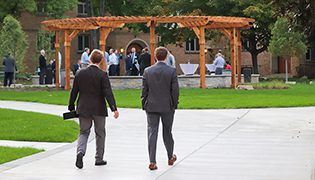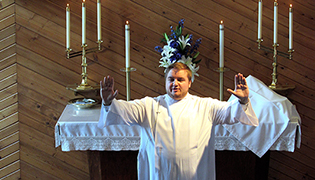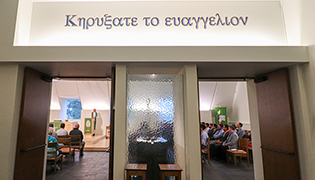Download in Adobe Reader format
Introduction
The Lord Jesus invites his disciples to pray for workers, because the harvest is plentiful but the workers are few (Matt 9:37–38). At his invitation, we ask the Lord of the harvest for pastors who know the truths of the Holy Scriptures, are able to teach, and have the character required to serve in the public ministry of the gospel. By instructing us to pray for gospel servants, Jesus teaches us that he—and he alone—provides workers for his church. The people of God who have a pastor to feed them with word and sacrament have the Lord to thank for that singular gift.
While the Ascended Savior alone provides pastors, we recognize that he normally chooses to work through means to do so. He uses schools and teachers to form reliable servants who will also be capable of teaching others. For more than 150 years, the Lord has answered the prayers of his people by working through the ministerial education schools of the Wisconsin Synod, from the preparatory level through the seminary, to provide pastors. The governing board, faculty, and staff of Wisconsin Lutheran Seminary (WLS) pray that the Lord will continue to work in them and through them to raise up gospel ministers for his Church. In adopting a strategic plan to guide our work through 2026, we express our confidence that the Lord will graciously use us, as instruments in his hands, to carry out his work of forming pastors for his people.
The theme of the strategic plan, “Pastors Forming Pastors to Proclaim God’s Praise,” alludes to Isaiah 43:21, in which the Lord speaks of his design for those he has made his own—that they would testify to his grace in everything they do. The theme more specifically honors the long-standing purpose of WLS. The Wisconsin Synod did not establish the seminary in the early 1860’s merely to provide theological education for any and all interested students. From the outset, the synod intended that its seminary would have a single purpose: to prepare men for service as pastors, addressing the ministerial needs of the church body. Men who express an interest in pastoral ministry receive in-depth instruction in the Word of God, providing a foundation for the lifetime of study required of those who desire to be faithful shepherds under Christ. The faculty of the seminary has always been comprised of men who have served as pastors and know firsthand the work for which they are preparing others. The strategic plan calls for a careful study of the training being offered, both in the classroom and in field experiences, so that graduates are well equipped for pastoral ministry, wherever they may be called to serve. The heart of the ministry for which the Lord forms pastors is to proclaim God’s praise, both to those who do not know Jesus as their Savior and to those who do.
This strategic plan was finalized in the midst of the COVID-19 pandemic. That was helpful timing, because the Lord was teaching his people day after day that human beings can only propose. He disposes. As Solomon wrote, “Many are the plans in a person’s heart, but it is the Lord’s purpose that prevails” (Prov 19:21). This strategic plan is both our proposal for the coming years and our earnest petition. We place it before our gracious Lord, asking him, for Jesus’ sake, to bless our labors in his name in the way he deems best. We trust him “who is able to do immeasurably more than all we ask or imagine, according to his power that is at work within us” (Eph 3:20), to enable us to carry out the privileged labor he has entrusted to us, for the glory of his name and the blessing of many.
—President Earle D. Treptow
Background
Technically speaking, the document that follows was the work of a committee comprised of four men, all professors at Wisconsin Lutheran Seminary. But it would be more accurate to say that dozens of different people contributed to its creation.
The project began in the fall of 2019, when what was originally called the campus improvement committee sent an online survey to the entire seminary family: professors, staff members, students and spouses. Over one hundred people completed the survey that focused on the campus buildings and grounds.
Sifting through the data caused the committee to realize that making wise decisions about our current and potentially new facilities would need to be a part of a larger long-range ministry plan. With a new name and a renewed focus, the strategic planning committee was born. Assisted by Professor Steven Thiesfeldt, recently retired Vice President for Administration at Martin Luther College, the committee set out to devise and implement a comprehensive planning process.
During the spring semester the committee conducted listening sessions with all the students on campus, as well as small groups of professors. Using a Strengths, Weaknesses, Opportunities, Threats (SWOT) analysis format, participants were asked to assess how well the seminary is fulfilling its stated objectives. This exercise yielded much valuable information that has been incorporated into the goals and initiatives of the strategic plan.
In addition to receiving input from students and approval from the faculty, the committee took steps to get an outside perspective. The pastor track faculty of Martin Luther College provided helpful feedback on a draft of the document. Committee members also worked closely with WELS leadership and the Wisconsin Lutheran Seminary Governing Board, which officially adopted the strategic plan on September 29, 2020.
What will come of all this planning? Only the Lord knows. He knows the future, and he knows and always does what is best for his children. As we strive to be good stewards of the gifts he has entrusted to us, we are confident that God will be with us and bless us and equip us with everything we need to carry out our work of forming pastors to proclaim God’s praise.
Mission, Vision, and Theme
Mission
The purpose of Wisconsin Lutheran Seminary is to equip pastors for the Wisconsin Evangelical Lutheran Synod or for churches and cultural groups within its confessional fellowship.
In partnership with sister seminaries and theological training programs of its fellowship, WLS accomplishes that singular purpose with two distinct emphases:
- Primarily, WLS prepares men to begin pastoral ministry by providing the spiritual, theological, and professional training needed to enter that ministry.
- WLS also partners with pastors in their ministry-long pursuit of spiritual, theological, and professional growth in all their God-given callings.
Vision
Wisconsin Lutheran Seminary forms confessional Lutheran pastors by supporting their growth in Christian faith, biblical wisdom, theological knowledge, and pastoral skill. We accomplish this by providing a gospel-focused, academically excellent curriculum and by nurturing a strong seminary family.
Theme
Pastors Forming Pastors to Proclaim God’s Praise (Isaiah 43:21)
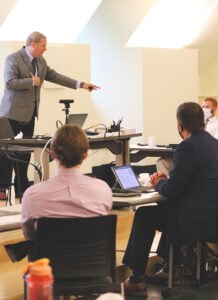
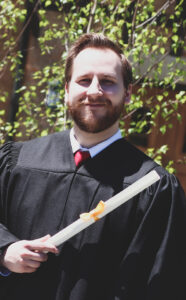
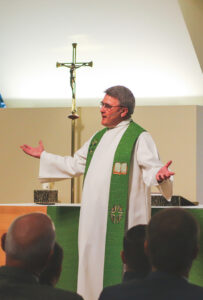
Goals and Initiatives
WE FORM PASTORS by fostering a pastors-training-pastors culture that is academically strong and that provides a faithful worldwide voice of gospel-focused Confessional Lutheran leadership.
- Confirm our commitment to having a faculty with evident pastoral hearts, significant and diverse ministry experience, and the intellectual aptitude for seminary teaching.
- Pursue potential accreditation through the Association of Theological Schools with the goal of improving our curriculum and enhancing our work of forming pastors.
- Establish a process to assess both our current activities and any potential additions on the basis of our mission.
- Support pastoral training programs throughout the world in partnership with WELS missions.
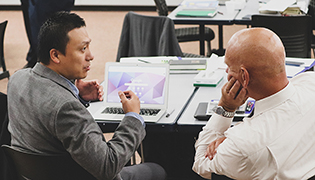
WE FORM PASTORS by supporting a faculty that is collegial and well equipped for their tasks academically, andragogically, and technologically.
- Implement a formal orientation process for new faculty.
- Provide training for all faculty to gain expertise in andragogically sound teaching and the effective use of technology.
- Develop a long-range plan to encourage ongoing growth for all professors while maintaining workable faculty course loads.
- Cultivate intentional collaboration among faculty on our campus and throughout our ministerial education system.
- Evaluate the possible reinstatement of the parish sabbatical program for faculty members.
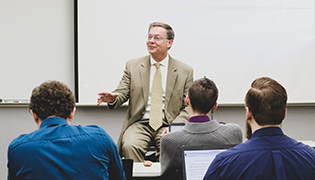
WE FORM PASTORS by providing experiential learning opportunities so as to foster zeal and competence in reaching the lost and equipping and partnering with the saints.
- Facilitate an authentic exchange of diverse demographic, generational, and broader cultural perspectives.
- Strengthen the vicar program by continuing to recruit an excellent corps of supervising pastors and providing them with regular and thorough training.
- Study the possibility of converting Winterim into completely experiential learning for both students and pastors.
- Explore an expanded summer assistant program and how that might work together with the Early Field Training program to better serve student growth.
WE FORM PASTORS by fostering strong relationships within the seminary family so that evangelical encouragement can be shared publicly, privately, and personally.
- Maintain excellence in campus worship.
- Foster stronger advisor/advisee relationships.
- Expand student-to-student encouragement.
- Create more opportunities to integrate students’ wives and children into the seminary family.
WE FORM PASTORS by helping faculty, students, and pastors to delight in, and live out, the doctrine of vocation.
- Study the time demands on both students and faculty to determine where changes may need to be made to allow them to honor all of their God-given callings.
- Develop a pattern of regular collegial consultation with faculty members to assist professors in making wise choices in accepting ministry tasks beyond core seminary duties.
- Provide expanded opportunities to teach the elements of a gospel-centered devotional life and to model its variety of expression.
- Strengthen how the seminary models faithful stewardship in regard to physical health.
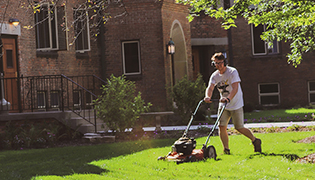
WE FORM PASTORS by providing capable staff and a campus whose beauty and facilities support the delivery of the curriculum and the needs of the seminary family.
- Develop a plan to update or add classrooms, large and small group educational and fellowship space, and accessible faculty and staff offices.
- Provide a library facility that is welcoming and well-equipped with resources for learning in a digital age.
- Analyze technology and support staff needs so as to handle administration efficiently, apply technology effectively, and utilize faculty wisely.
- Establish a plan to make the campus even more user friendly and readily accessible as an exercise, fellowship, and recreation resource for the seminary family.
- Study the feasibility of providing married student housing on or near campus.
